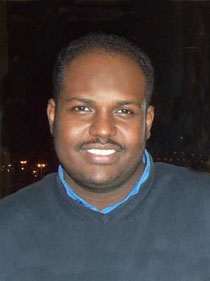Mohammed Hamid in the area of Cognitive radio and opportunistic spectrum access
Published Feb 15, 2013
Mohammed Hamid from Sudan got his Master degree from Blekinge tekniska högskola in Sweden. After that he came to KTH for PhD studies in the area of cognitive radio and dynamic spectrum access. Now he has defended his licentiate thesis On Finding Spectrum Opportunities in Cognitive Radios: Spectrum Sensing and Geo-locations Database.

Where are you from and where did you study before coming to KTH-ICT?
– I am from Sudan. Before coming to KTH I studied in Sudan, University of Khartoum where I obtained my Bachelor degree in Electrical Engineering. After that, I got a master degree from Blekinge tekniska högskola, Sweden, in Electrical Engineering with emphasis on Radio Communication.
What is your topic and why did you choose it?
– Generally, my topic is in the area of cognitive radio and dynamic spectrum access. Specifically, I have been looking for the aspects of how to find the free of use radio spectrum that can be utilized on a secondary basis. I have chosen this topic since I was doing my master thesis and for my PhD it was a very interesting continuation for me, besides, I was very fortunate to join KTH shortly after launching QUASAR project a big European project in the area of dynamic spectrum access and it was a great experience to be part of such successful project.
Describe your topic in short
– My topic is basically a study and investigation on how the secondary users can locate the temporary or geographically unused licensed frequency bands with the concern of not causing harmful interference to the primary licensed users of those bands. Moreover, I have been working on the transmission parameters assignment, which assures as best quality of communication as possible for both primary and secondary users.
Tell us something about your results
– So far, we have developed a technique for secondary users to blindly detect the free of use radio resources. We have experimentally verified the feasibility of applying this technique and we compared its performance with some existing techniques and the findings show that the technique is quite promising. Furthermore, we have introduced a new approach to set the parameters of the detection process aiming at improving the performance of detection. Finally, we studied a real life scenario of accessing the TV broadcasting spectrum in the area of Gävle, Sweden on a secondary basis and we quantified the opportunities of such scenario.
What will the future bring for your research, how will you continue and what focus will you have on your PhD thesis?
– Cognitive radio and opportunistic spectrum access is attracting more and more attention a day after another so I will keep investigating how the spectrum opportunities can be found not only theoretically but I will try to experimentally quantify these spectrum opportunities. Moreover, I will study the feasibility and benefits of deploying different classes of secondary systems in different types of licensed bands.

